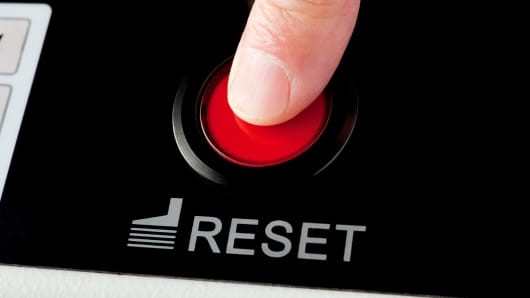As the Brits fled the European Union, so did money from stocks. But after a stomach-curdling free-fall, U.S. equities boomeranged back — a weird financial-markets mulligan. Pundits cheered.
Enough with the cheering. It's important that we, as responsible investors, find out why the market bounced back — not just hug it for rising when there is no apparent reason.
First, it's important to note that the market isn't really up: The S&P 500 closed at 2090 on Tuesday, just two points above where it finished at the end of 2014.
And, while trading volume may have been heavy during the Brexit-induced fall and subsequent rebound, nearly half of all trading for the last two weeks of June was short trades, bets that a particular asset will fall, according to ModernIR.
The bottom line is that the fundamentals of the economy and market don't look good: Whoever you're listening to — the Federal Reserve, to the Organization for Economic Cooperation and Development, to the International Monetary Fund — hoary heads of the dismal science see deepening malaise worsened by the Brexit, creaky European banks, possible copycat flight from the euro zone — even a slowdown for the U.S.
Can a market characterized by declining money flows, weakening fundamentals and arbitrage that has posted no material gain in over 18 months gather steam? Anything is possible. But it's not a sound conclusion.
Plus, stocks are a mirror for something larger. ModernIR calls it the Great Risk Asset Revaluation. Starting in 2009, the Federal Reserve bought trillions' worth of government and mortgage debt with dollars it created. Much of that money found its way via banks into risk assets — things with variable valuation — such as stocks, bonds, real estate and commodities like oil. Prices for these soared.
And then it all stopped. The Fed's balance sheet was about $500 billion in 1998 and expanded to $4.5 trillion by 2014. However, it has stayed around that level for the past two years. Since then, the U.S. stock market has not risen and the global economy has been thrown into turmoil.
It's all about the money. Not how much is in the stock market but what the value of the U.S. dollar is relative to other currencies. When the Fed ceases expanding its balance sheet, the dollar appreciates. It's math. The bad news is that prices of risk assets will reset correspondingly lower. The good news is that it's the way back to reality.
When? In the housing crisis, it was two years after home prices stopped rising that the bottom fell out of the mortgage-backed securities market. In August, it'll be two years since the Fed's balance sheet stalled. Oil alone has repriced so far.
Whenever the stock reset comes (and much will be done to stop it), we'll all survive it — and real opportunity will again abound. Besides, who wants a market that seems too good to be true?
This market is one to fear — not love. Think about that the next time you go in for a hug.
Commentary by Tim Quast, the founder and president of market structure analytics firm Modern Networks IR LLC in Denver. Follow him on Twitter @_TimQuast.
For the latest commentary on markets in the U.S. and around the world, follow @CNBCopinion on Twitter.


